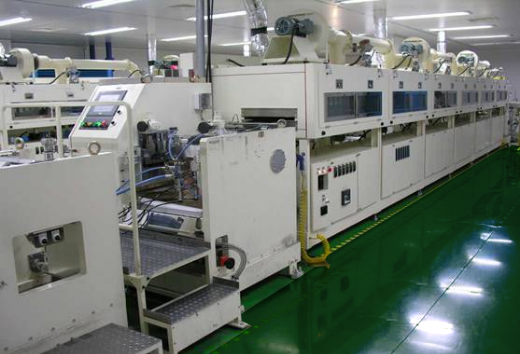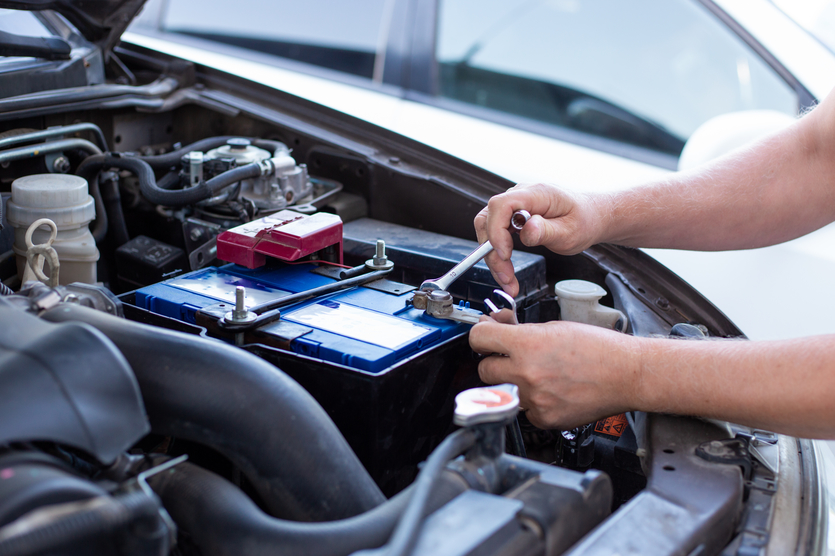会社のニュース
-
 Introduction As technology continues to evolve, the need for efficient and durable power solutions becomes increasingly important. One such solution is the 12V LiFePO4 battery, which offers a range of benefits over traditional lead-acid batteries. Efficiency LiFePO4 batteries are highly efficient, with a charge efficiency of up to 99%, meaning that almost all the energy put into the battery is stored for later use. This is in contrast to lead-acid batteries, which typically have a charge efficiency of around 80%. LiFePO4 batteries also have a lower internal resistance, which means that they can deliver more power to the devices they are powering. Durability LiFePO4 batteries […]続きを読む
Introduction As technology continues to evolve, the need for efficient and durable power solutions becomes increasingly important. One such solution is the 12V LiFePO4 battery, which offers a range of benefits over traditional lead-acid batteries. Efficiency LiFePO4 batteries are highly efficient, with a charge efficiency of up to 99%, meaning that almost all the energy put into the battery is stored for later use. This is in contrast to lead-acid batteries, which typically have a charge efficiency of around 80%. LiFePO4 batteries also have a lower internal resistance, which means that they can deliver more power to the devices they are powering. Durability LiFePO4 batteries […]続きを読む -
 The LiFePO4 battery, also known as the lithium iron phosphate battery, is a type of rechargeable battery that has gained popularity in recent years due to its high energy density, long cycle life, and safety features. However, like all batteries, LiFePO4 batteries have a finite lifespan and will eventually need to be replaced. In this article, we will explore the lifespan of a LiFePO4 battery and how to extend its longevity. The lifespan of a LiFePO4 battery can vary depending on several factors such as usage, temperature, and charging habits. Generally, LiFePO4 batteries can last between 2,000 to 5,000 cycles, which translates to approximately 5 to 15 years of […]続きを読む
The LiFePO4 battery, also known as the lithium iron phosphate battery, is a type of rechargeable battery that has gained popularity in recent years due to its high energy density, long cycle life, and safety features. However, like all batteries, LiFePO4 batteries have a finite lifespan and will eventually need to be replaced. In this article, we will explore the lifespan of a LiFePO4 battery and how to extend its longevity. The lifespan of a LiFePO4 battery can vary depending on several factors such as usage, temperature, and charging habits. Generally, LiFePO4 batteries can last between 2,000 to 5,000 cycles, which translates to approximately 5 to 15 years of […]続きを読む -
 LiFePO4 batteries have become increasingly popular in recent years due to their long lifespan and high performance. They are widely used in various applications, including electric vehicles, renewable energy systems, and portable electronics. However, how long can a LiFePO4 battery last? In this article, we will explore the lifespan of a LiFePO4 battery and factors that affect its longevity. Firstly, it is important to understand what determines the lifespan of a battery. The lifespan of a LiFePO4 battery is primarily determined by the number of charge and discharge cycles it undergoes. Each cycle involves charging the battery to its full capacity and then discharging it until it reaches a […]続きを読む
LiFePO4 batteries have become increasingly popular in recent years due to their long lifespan and high performance. They are widely used in various applications, including electric vehicles, renewable energy systems, and portable electronics. However, how long can a LiFePO4 battery last? In this article, we will explore the lifespan of a LiFePO4 battery and factors that affect its longevity. Firstly, it is important to understand what determines the lifespan of a battery. The lifespan of a LiFePO4 battery is primarily determined by the number of charge and discharge cycles it undergoes. Each cycle involves charging the battery to its full capacity and then discharging it until it reaches a […]続きを読む -
 Introduction Lithium batteries are rechargeable batteries that are commonly used in portable electronic devices and electric vehicles. They are popular because they have a high energy density, meaning they can store a large amount of energy in a small volume or weight. This makes them ideal for use in portable devices that require a long-lasting battery. In this article, we will discuss how lithium batteries work, their advantages and disadvantages, and their applications. How Lithium Batteries Work Lithium batteries work based on the movement of ions between the positive and negative electrodes. The positive electrode is typically made of lithium cobalt oxide or lithium iron phosphate, while […]続きを読む
Introduction Lithium batteries are rechargeable batteries that are commonly used in portable electronic devices and electric vehicles. They are popular because they have a high energy density, meaning they can store a large amount of energy in a small volume or weight. This makes them ideal for use in portable devices that require a long-lasting battery. In this article, we will discuss how lithium batteries work, their advantages and disadvantages, and their applications. How Lithium Batteries Work Lithium batteries work based on the movement of ions between the positive and negative electrodes. The positive electrode is typically made of lithium cobalt oxide or lithium iron phosphate, while […]続きを読む -
 Lithium Iron Phosphate (LiFePO4) batteries are a type of rechargeable battery that are known for their high energy density and long cycle life. They are commonly used in electric vehicles, energy storage systems and portable devices. One important factor that affects the performance of LiFePO4 batteries is temperature. Like all batteries, LiFePO4 batteries have a temperature range in which they can operate effectively. Outside of this range, the battery may suffer damage and its performance may be degraded. The recommended temperature range for LiFePO4 batteries is between -20°C and 60°C. This means that the battery can be safely discharged and charged within this temperature range without experiencing any […]続きを読む
Lithium Iron Phosphate (LiFePO4) batteries are a type of rechargeable battery that are known for their high energy density and long cycle life. They are commonly used in electric vehicles, energy storage systems and portable devices. One important factor that affects the performance of LiFePO4 batteries is temperature. Like all batteries, LiFePO4 batteries have a temperature range in which they can operate effectively. Outside of this range, the battery may suffer damage and its performance may be degraded. The recommended temperature range for LiFePO4 batteries is between -20°C and 60°C. This means that the battery can be safely discharged and charged within this temperature range without experiencing any […]続きを読む -
 The 48V LiFePO4 battery is one of the most advanced energy storage solutions available in the market. With its long-lasting energy capacity and superior performance, this battery has become increasingly popular for industrial, commercial, and residential applications. LiFePO4 batteries are made using advanced Lithium Iron Phosphate technology, which is known for its high energy density, low self-discharge rate, and long cycle life. These batteries have a nominal voltage of 48V and can provide power for a wide range of applications, including electric vehicles, renewable energy systems, backup power, and more. One of the primary advantages of the 48V LiFePO4 battery is its exceptional energy density. These batteries can […]続きを読む
The 48V LiFePO4 battery is one of the most advanced energy storage solutions available in the market. With its long-lasting energy capacity and superior performance, this battery has become increasingly popular for industrial, commercial, and residential applications. LiFePO4 batteries are made using advanced Lithium Iron Phosphate technology, which is known for its high energy density, low self-discharge rate, and long cycle life. These batteries have a nominal voltage of 48V and can provide power for a wide range of applications, including electric vehicles, renewable energy systems, backup power, and more. One of the primary advantages of the 48V LiFePO4 battery is its exceptional energy density. These batteries can […]続きを読む -
 Lithium iron phosphate (LiFePO4) motorcycle battery is one of the most reliable and efficient power sources available in the market today. This type of battery has several advantages over traditional lead-acid batteries, making it a popular choice among motorcycle owners. LiFePO4 motorcycle batteries have gained popularity due to their high energy density, long cycle life, and low self-discharge rate. In this article, we will discuss the benefits of using a LiFePO4 motorcycle battery. Firstly, the energy density of LiFePO4 batteries is much higher than traditional lead-acid batteries. This means that the same amount of energy can be stored in a smaller package, making it ideal for motorcycles where space […]続きを読む
Lithium iron phosphate (LiFePO4) motorcycle battery is one of the most reliable and efficient power sources available in the market today. This type of battery has several advantages over traditional lead-acid batteries, making it a popular choice among motorcycle owners. LiFePO4 motorcycle batteries have gained popularity due to their high energy density, long cycle life, and low self-discharge rate. In this article, we will discuss the benefits of using a LiFePO4 motorcycle battery. Firstly, the energy density of LiFePO4 batteries is much higher than traditional lead-acid batteries. This means that the same amount of energy can be stored in a smaller package, making it ideal for motorcycles where space […]続きを読む -
 Introduction Lithium Iron Phosphate (LiFePO4) batteries are a type of rechargeable battery that have gained popularity in recent years due to their superior characteristics compared to other types of batteries. LiFePO4 batteries are known for their long cycle life, high energy density, and safety features. In this article, we will discuss the characteristics and performance of LiFePO4 batteries. Battery Chemistry LiFePO4 batteries are composed of three main components: a lithium iron phosphate cathode, a graphite anode, and an electrolyte. The cathode is made up of lithium iron phosphate, which is a stable and non-toxic material. This makes LiFePO4 batteries safer than other types of lithium-ion batteries, such […]続きを読む
Introduction Lithium Iron Phosphate (LiFePO4) batteries are a type of rechargeable battery that have gained popularity in recent years due to their superior characteristics compared to other types of batteries. LiFePO4 batteries are known for their long cycle life, high energy density, and safety features. In this article, we will discuss the characteristics and performance of LiFePO4 batteries. Battery Chemistry LiFePO4 batteries are composed of three main components: a lithium iron phosphate cathode, a graphite anode, and an electrolyte. The cathode is made up of lithium iron phosphate, which is a stable and non-toxic material. This makes LiFePO4 batteries safer than other types of lithium-ion batteries, such […]続きを読む -
 3.2V LiFePO4 Battery: A Comprehensive Overview The 3.2V LiFePO4 battery, also known as the lithium iron phosphate battery, is a rechargeable battery that has gained widespread use in the energy storage industry due to its various advantages over other types of batteries. In this article, we will provide a comprehensive overview of the 3.2V LiFePO4 battery, including its composition, characteristics, applications, and benefits. Composition and Characteristics The 3.2V LiFePO4 battery consists of four main components: cathode, anode, separator, and electrolyte. The cathode is made up of lithium iron phosphate (LiFePO4), while the anode is typically made up of carbon. The separator is a thin layer that separates […]続きを読む
3.2V LiFePO4 Battery: A Comprehensive Overview The 3.2V LiFePO4 battery, also known as the lithium iron phosphate battery, is a rechargeable battery that has gained widespread use in the energy storage industry due to its various advantages over other types of batteries. In this article, we will provide a comprehensive overview of the 3.2V LiFePO4 battery, including its composition, characteristics, applications, and benefits. Composition and Characteristics The 3.2V LiFePO4 battery consists of four main components: cathode, anode, separator, and electrolyte. The cathode is made up of lithium iron phosphate (LiFePO4), while the anode is typically made up of carbon. The separator is a thin layer that separates […]続きを読む -
 As technology continues to advance, the need for reliable and efficient power sources has become more crucial. In recent years, the 12V LiFePO4 battery has gained popularity as a durable and efficient power source for various applications. In this article, we will explore what a 12V LiFePO4 battery is, its advantages over other battery types, and its uses. What is a 12V LiFePO4 battery? A 12V LiFePO4 battery is a type of lithium-ion battery that uses lithium iron phosphate as its cathode material. Compared to other lithium-ion batteries, LiFePO4 batteries have a longer lifespan, better thermal stability, and are less prone to explosion or fire. They also have […]続きを読む
As technology continues to advance, the need for reliable and efficient power sources has become more crucial. In recent years, the 12V LiFePO4 battery has gained popularity as a durable and efficient power source for various applications. In this article, we will explore what a 12V LiFePO4 battery is, its advantages over other battery types, and its uses. What is a 12V LiFePO4 battery? A 12V LiFePO4 battery is a type of lithium-ion battery that uses lithium iron phosphate as its cathode material. Compared to other lithium-ion batteries, LiFePO4 batteries have a longer lifespan, better thermal stability, and are less prone to explosion or fire. They also have […]続きを読む -
 Lithium iron phosphate (LiFePO4) is a type of rechargeable battery that falls under the category of lithium-ion batteries. Lithium-ion batteries are a broad term that includes several different types of batteries that use lithium ions to store and release energy. LiFePO4 batteries are known for their high energy density, long cycle life, and safety features. They are commonly used in electric vehicles, portable power tools, and solar power systems. LiFePO4 batteries have a nominal voltage of 3.2 volts per cell and a specific energy of around 90-120 Wh/kg. One of the biggest advantages of LiFePO4 batteries is their safety. Unlike other types of lithium-ion batteries, LiFePO4 batteries are […]続きを読む
Lithium iron phosphate (LiFePO4) is a type of rechargeable battery that falls under the category of lithium-ion batteries. Lithium-ion batteries are a broad term that includes several different types of batteries that use lithium ions to store and release energy. LiFePO4 batteries are known for their high energy density, long cycle life, and safety features. They are commonly used in electric vehicles, portable power tools, and solar power systems. LiFePO4 batteries have a nominal voltage of 3.2 volts per cell and a specific energy of around 90-120 Wh/kg. One of the biggest advantages of LiFePO4 batteries is their safety. Unlike other types of lithium-ion batteries, LiFePO4 batteries are […]続きを読む -
 Introduction Batteries play an essential role in today\’s world, powering everything from mobile phones to electric cars. Two types of batteries that have gained popularity in recent years are LiFePO4 and lithium-ion batteries. While both batteries are lithium-based, they differ in their composition and performance. In this article, we will compare LiFePO4 vs lithium-ion batteries and determine which one is the better option. Composition LiFePO4 batteries are composed of lithium iron phosphate as the cathode material, graphite as the anode material, and an electrolyte solution. On the other hand, lithium-ion batteries use lithium cobalt oxide, lithium manganese oxide, or lithium iron phosphate as the cathode material and […]続きを読む
Introduction Batteries play an essential role in today\’s world, powering everything from mobile phones to electric cars. Two types of batteries that have gained popularity in recent years are LiFePO4 and lithium-ion batteries. While both batteries are lithium-based, they differ in their composition and performance. In this article, we will compare LiFePO4 vs lithium-ion batteries and determine which one is the better option. Composition LiFePO4 batteries are composed of lithium iron phosphate as the cathode material, graphite as the anode material, and an electrolyte solution. On the other hand, lithium-ion batteries use lithium cobalt oxide, lithium manganese oxide, or lithium iron phosphate as the cathode material and […]続きを読む -
 Lithium Iron Phosphate (LiFePO4) is a type of rechargeable battery that offers a number of advantages over traditional lead-acid batteries. In recent years, LiFePO4 batteries have become increasingly popular in the world of motorcycles due to their high energy density, longer lifespan, and reduced weight. One of the key benefits of using a LiFePO4 battery in a motorcycle is the increased energy density. LiFePO4 batteries are able to store more energy per unit of weight than traditional lead-acid batteries, which means that they can provide the same or greater amount of power while taking up less space and weighing less. This can be particularly important for motorcycles, which often […]続きを読む
Lithium Iron Phosphate (LiFePO4) is a type of rechargeable battery that offers a number of advantages over traditional lead-acid batteries. In recent years, LiFePO4 batteries have become increasingly popular in the world of motorcycles due to their high energy density, longer lifespan, and reduced weight. One of the key benefits of using a LiFePO4 battery in a motorcycle is the increased energy density. LiFePO4 batteries are able to store more energy per unit of weight than traditional lead-acid batteries, which means that they can provide the same or greater amount of power while taking up less space and weighing less. This can be particularly important for motorcycles, which often […]続きを読む -
 A 12V LiFePO4 battery is a reliable and efficient power source that is increasingly used in many applications. LiFePO4 stands for Lithium Iron Phosphate, which is the chemical compound used as the cathode material in the battery. Compared to other types of lithium-ion batteries, LiFePO4 batteries offer several advantages, such as longer lifespan, higher safety, and more stable performance. In this article, we will explore the benefits and applications of 12V LiFePO4 batteries in detail. Firstly, let’s discuss the lifespan of a 12V LiFePO4 battery. One of the most significant advantages of this type of battery is its long life cycle. A LiFePO4 battery can last up to 10 […]続きを読む
A 12V LiFePO4 battery is a reliable and efficient power source that is increasingly used in many applications. LiFePO4 stands for Lithium Iron Phosphate, which is the chemical compound used as the cathode material in the battery. Compared to other types of lithium-ion batteries, LiFePO4 batteries offer several advantages, such as longer lifespan, higher safety, and more stable performance. In this article, we will explore the benefits and applications of 12V LiFePO4 batteries in detail. Firstly, let’s discuss the lifespan of a 12V LiFePO4 battery. One of the most significant advantages of this type of battery is its long life cycle. A LiFePO4 battery can last up to 10 […]続きを読む -
 Lithium Iron Phosphate (LiFePO4) batteries are a type of rechargeable battery that have been gaining popularity in recent years. These batteries are known for their high energy density, long life cycle, and safety. As a result, they are commonly used in a variety of applications, including electric vehicles, solar energy storage systems, and portable electronics. One of the main benefits of LiFePO4 batteries is their long life cycle. These batteries can typically be charged and discharged hundreds or even thousands of times without experiencing a significant decrease in capacity. This means that they can last for many years, making them a cost-effective solution for many applications. Another benefit […]続きを読む
Lithium Iron Phosphate (LiFePO4) batteries are a type of rechargeable battery that have been gaining popularity in recent years. These batteries are known for their high energy density, long life cycle, and safety. As a result, they are commonly used in a variety of applications, including electric vehicles, solar energy storage systems, and portable electronics. One of the main benefits of LiFePO4 batteries is their long life cycle. These batteries can typically be charged and discharged hundreds or even thousands of times without experiencing a significant decrease in capacity. This means that they can last for many years, making them a cost-effective solution for many applications. Another benefit […]続きを読む -
 Trains have come a long way since their inception in the early 19th century. They have revolutionized transportation in more ways than one, moving both goods and people across vast distances with remarkable speed, efficiency, and safety. But what makes these behemoths of the transportation world tick? The answer lies in their power source – the locomotive starter battery. The locomotive starter battery is a critical component that powers up the train and allows it to start moving. It provides a reliable and high-powered source of energy to the train’s engine, enabling it to generate the necessary torque and power to move the train along the tracks. In […]続きを読む
Trains have come a long way since their inception in the early 19th century. They have revolutionized transportation in more ways than one, moving both goods and people across vast distances with remarkable speed, efficiency, and safety. But what makes these behemoths of the transportation world tick? The answer lies in their power source – the locomotive starter battery. The locomotive starter battery is a critical component that powers up the train and allows it to start moving. It provides a reliable and high-powered source of energy to the train’s engine, enabling it to generate the necessary torque and power to move the train along the tracks. In […]続きを読む

